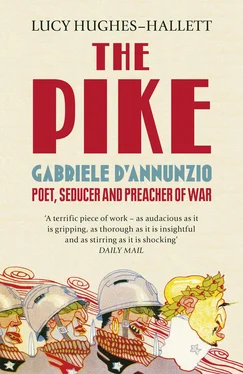1 ...8 9 10 12 13 14 ...39 They make the short journey to the Palazzo Barbarigo. D’Annunzio has a rented apartment there, but it is less a home than a furniture depository, being crammed with the contents of the house in France that he left six years previously. Nine lorries were required to bring the mass of his possessions to Venice – the thousands of books, the hundreds of Buddhas, the scores of reproductions of paintings of St Sebastian. Now they are stacked up, higgledy-piggledy, in the lofty rooms. Documents spill from boxes. Dusty carpets are heaped in a corner. D’Annunzio’s housekeeper has sought to please her master by heating the place to his preferred inordinate temperature. As they enter, Antongini and the officer begin to sweat.
The next day d’Annunzio summons six of his acolytes. He is tetchy, exasperated by the mess surrounding him. He orders them off to search northern Italy for a new home for him. He needs a grand piano, a bathroom, a laundry, plenty of wood and coal, an enclosed garden. ‘If within eight days,’ he says ‘none of you has found a suitable house for me, I shall throw myself into the canal.’
January 1925. D’Annunzio is in the house on the mountain slopes above Lake Garda, where he will spend the rest of his life and which he will gradually transform into a bizarre piece of installation art: part display case for his vast and eclectic range of possessions; part externalisation of his own multi-faceted personality; part war memorial, part garden of earthly delights; part mausoleum. He calls it the Vittoriale.
Benito Mussolini has taken his political place, bullying his way to the premiership by marching on Rome in October 1922. It suits Mussolini that the Italian public should believe that d’Annunzio is whole-heartedly behind the new regime, but in truth they are suspicious of each other. The poet is a maverick, and still dangerously influential: he has to be kept on side. His insatiable need for money presents a point of leverage. ‘When a decayed tooth cannot be pulled out it is capped with gold,’ says Mussolini. He acts accordingly.
Mussolini greatly increases the strangeness of the Vittoriale by contributing to the jumble of objects it contains some Brobdignagian souvenirs. First comes the plane in which d’Annunzio once overflew Vienna (d’Annunzio will build a rotunda especially to house it). Next is the motor boat in which d’Annunzio made a daring raid on the Austrian fleet: d’Annunzio roars up and down the lake in it (and catches a bad cold). Next, dismantled and transported on over twenty flat-bed railway trucks, comes the forward half of a battleship, the Puglia. Offloaded at the railway station in Desenzano and laboriously transported piecemeal along the lake shore and up the mountainside to d’Annunzio’s fastness, it is there reassembled. Set in concrete, its missing rear recreated in stone, it juts out from the side of the cypress-covered slope above d’Annunzio’s rose garden as though breaking through a petrified wave. The gift comes complete with a set of real live sailors, whom d’Annunzio drills on deck.
And now we can see d’Annunzio with our own eyes. On YouTube we can watch a Fox Movietone newsreel showing a little party he gives on the Puglia’s deck soon after its installation. Proceedings open with the tolling of a great bell. Then comes a six-gun salute, smoke from the ship’s cannon cloaking the hillside. The host appears on deck, in military uniform with a chest full of decorations, smilingly escorting some ladies in cloche hats. A string quartet plays: d’Annunzio listens attentively (the camera politely staying on the side of his good eye). He is stouter now, and slightly stooped. He plays a few notes on a clarinet. Cut. Now d’Annunzio is cackling merrily, revealing that he is almost toothless. People are often surprised – given the total humourlessness of his writing – to find how playful he can be. He has been invited to recite some verse for the film crew. He waves his hands and gabbles, amidst more laughter, the opening lines of Dante’s Inferno, before turning back to his female friends.
Only three years before his own accession to power, Mussolini wrote to d’Annunzio suggesting the overthrow of the Italian monarchy and the establishment of a ‘Directory’ with d’Annunzio as president. It was d’Annunzio who was the Duce then, while Mussolini was content to act as his enforcer. Now d’Annunzio is a lost leader. Throughout the 1920s there will be people looking to him to exploit his immense public following and give them a lead: fascists dismayed by the compromises Mussolini makes on his way to consolidating his power; anti-fascists who believe the poet could become the figurehead of a less brutal regime. They look in vain.
September 1937. The railway station in Verona. Mussolini is on his way back to Rome after visiting his new ally, Adolf Hitler, and showing himself to the German people. D’Annunzio – vehemently anti-German all his life – has described Hitler to Mussolini as ‘a ferocious clown’. All the same, although he seldom leaves the Vittoriale now, he travels from Garda to pay his respects. He is seventy-four, and although he is still goatishly proud of his sexual prowess, he is dreadfully aged, by time, but also by syphilis and by the quantity of cocaine he has been taking.
A newsreel, here described by d’Annunzio’s French biographer Philippe Jullian, records the occasion: ‘D’Annunzio, on the arm of the architect Maroni, shuffles along the red carpet up to the carriage window, through which the Duce is leaning. With the smile of an ogre, Mussolini takes the poet’s hand in his.’ Mussolini, descending from the train, makes his way towards a balcony from which he is to address the assembled crowd. ‘The little old man toddles after him, chattering away and waving his withered hands in the air; Mussolini, without slowing down, smiles down at him from time to time, but the ovations of the crowd prevent him from hearing a word of what d’Annunzio is saying.’ Eventually the Duce pushes brusquely ahead, pointedly not inviting d’Annunzio to join him, leaving the poet to struggle back to his car through the oblivious crowd.
According to Mussolini’s spy at the Vittoriale, what d’Annunzio claims to have been trying to say to the Duce was: ‘I admire you more than ever for what you are doing.’ But Maroni, whom d’Annunzio trusts, reports that he returns to the Vittoriale in a state of acute depression, murmuring: ‘This is the end.’ Five months later he will be dead.
SIX MONTHS
JUST AFTER DAWN on Good Friday 1915, Fly, Gabriele d’Annunzio’s favourite among his several dozen greyhounds, died in a veterinary clinic in Paris. The poet had stayed up most of the night while Fly leaned trembling against him, one of her legs so swollen she couldn’t lie down. Eventually the vet declared that he must ‘liberate’ her. While he did so d’Annunzio walked the streets. It was a public holiday, the most doleful festival in the Christian calendar, and Paris was anyway three-quarters empty: most of the city’s well-to-do inhabitants had fled when the government decamped to Bordeaux the previous autumn. What few people d’Annunzio passed were all men in uniform, and wounded. He stopped at the window of a musical instrument shop to admire some violins (as a connoisseur of music and of fine workmanship he was very interested in the luthier’s craft). Their delicate lines, their gilded darkness, reminded him of his dear dog.
Back at the surgery, the attendant uncovered Fly’s body for him. Her eyes, always before so adoringly fixed on him, were ‘blackened slots’. He had the corpse wrapped in cotton wool, then in a linen sheet, then in red damask, and finally laid in a white lacquered casket. As the workman nailed down the lid he remembered how much Fly had feared being alone in the dark. With the coffin in the back of his car he drove very slowly out to the farm near Versailles where his more-or-less-discarded mistress, Nathalie Goloubeff, cared for his dwindling pack of hounds. Since France had gone to war many of them had had to be put down for lack of food.
Читать дальше












